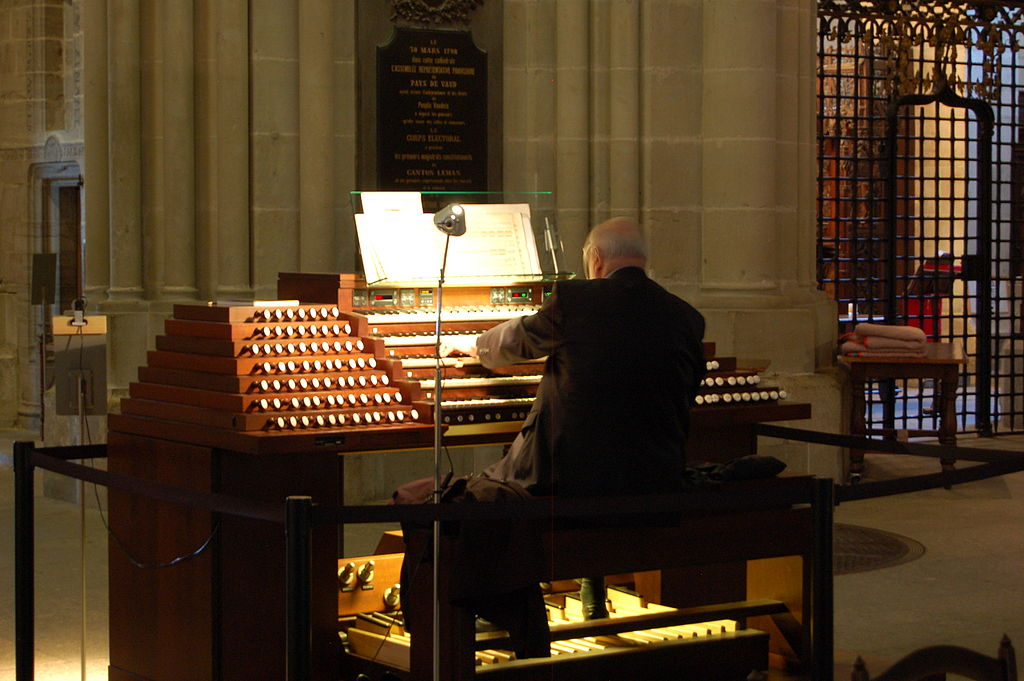|
As a church musician for nearly 40 years now (Lordy...), there has always been one aspect of my duties that has made me question its validity, purpose, and frankly, effectiveness: the prelude and postlude. Every organist can relate to the experience of practicing diligently on an impressive slice of organ repertoire only to be met with the white noise of a chatty congregation during the prelude or the backs and roar of the congregation as they depart during the postlude. So, then, an organist will inevitably ask themselves, why am I doing this? This is just an observation and not an accusation. And the musical culture of congregations vary greatly from one another in this way. And it is simply human nature to speak to one another when in groups, especially if everyone just likes each other! But the question remains then: what is the purpose of music before and after a worship service? Can it be of benefit to a congregation to listen more attentively? A few thoughts from your friendly neighborhood organist. Traditional Christian worship services are inevitably based on the Catholic Mass. According to the rubrics, the Mass begins when the priest enters the sanctuary and ends when he exits. Music before and after the liturgy then is only supplementary and not required. The Protestant Reformation placed a greater emphasis on music and figured prominently in Luther's theology. And so we have the great chorale preludes of Bach and other composers well suited to be used throughout worship. The French organist tradition of improvisation resulted in epic "sorties" at the end of liturgies and preludes created by virtuosic organists in the moment. From my experience, denominations tend to have music cultures that are reasonably consistent across the board. This is also influenced by a church's worship style characterized by a "high" or "low" church approach and, of course, by the congregation itself. Despite all these variables however, I feel there is a pragmatic approach to allow everyone to experience the prelude and postlude in their own way while being mindful of fellow congregants who choose another approach more meaningful to them. So what do these mysterious musical offerings mean to me? First, the prelude. It allows the organist or musicians to set a visceral tone for the service. The affect presented is often serene, meditative, (an introspective joy) to foster a prayerful environment for those who wish to prepare mindfully for worship. But the music can also be exuberant, celebratory...loud! I like to use this approach on feast days such as Easter Sunday, for example. The prelude. however, is a time for gathering! Some may prefer to chat quietly with their neighbor. And that is just fine as long as one respects the fact that some may wish to have silence (or near silence) to gather their thoughts and meditate upon the music being offered. The postlude. As an organist, it is always great fun to "turn it up." I consider it very rock-n-roll to play exciting and intense music at high volumes. You should try it. Primarily, I consider it an exclamation point to the worship service. A synopsis of all that came before in the liturgy and a reminder of the joy and hope we should have as Christians. And sometimes, there are exceptions to this joyful affect. An example would be the Maundy Thursday postlude, of which the events of Holy Week requires an appropriate introspective musical expression of intimacy, solemnity, sublimity. And I can't tell you how surprised I was my first Sunday with you all when, after my postlude, you were still seated! That is rare and wonderful. It reminds me of the bonus scene in the 1986 film Ferris Bueller's Day Off when Matthew Broderick turns to the camera after the credits are done, breaking the Fourth Wall, and says to the viewer, "You're still here? It's over. Go home." I've wanted to do that many times....not really. it's appreciated! So just some thoughts and considerations from the One on the Bench. You may have noticed an indication and reminder in the bulletin inserts as well to allow an introspective time during the prelude for those who wish it. We all worship in different ways and that is just another piece of our diversity here at Plymouth. I suggest we continue to be mindful of these differences and perhaps even give the hoary tradition of the Prelude and Postlude a chance to resonate within ourselves. It could happen. Mark Heiskanen Director of Music/Organist AuthorMark Heiskanen has been Plymouth's Director of Music since September 2017. Originally from Northeast Ohio, Mark has experience and great interest in a diverse range of musical styles including jazz, rock, musical theatre, and gospel. He is thrilled to serve a congregation and staff that values diversity and inclusion in all facets of life. Read his mostly-weekly Music Minute here. Comments are closed.
|
Details
|

 RSS Feed
RSS Feed